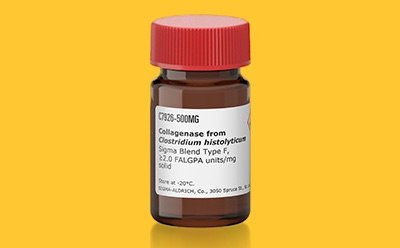Collagenase

Collagenase is an endopeptidase that effectively breaks down the collagen at its peptide bond regions under physiological pH & temperature conditions. Being a protein, it is highly sensitive to pH, temperature, and several other factors that can lead to protein denaturation. The activity, conformation, and properties of collagenase are highly influenced by external factors.
Collagenase consists of different types, such as I, II, III, IV, V, VI VII, VIII, XI, and a special collagenase for liver cells. Collagenase from Clostridium histolyticum is classified into 6 groups, namely, viz, alpha, beta, gamma, delta, epsilon, and zeta. It serves as an important catalyst and finds applications in stem cell biology, cancer research, and immunology.
Products
Collagenase for cell/tissue isolation
Collagenase supports a wide range of research as it can be used to isolate cells/tissues by degrading collagen in the skin, blood vessels, tendons, and bones. The type of collagenase is chosen based on the specific type of cell or tissue that needs to be isolated. Collagenase type I is suitable for the isolation of fat, lung, epithelial, and adrenal tissue cells. Collagenase type II is ideal for the separation of the liver, thyroid, bone, heart, and salivary gland tissues. Collagenase type IV can break down a variety of tissues, and type V is applicable in the isolation of pancreatic islet tissues by separating the connective tissues into single cells. Collagenase disaggregation is ideal for culturing mouse kidneys, human adult, and fetal brains.
Collagenase for cell culture
Collagenase is gentle, requires no agitation, and dissociates well at optimum temperature and pH. Therefore, it is ideal for culturing mouse kidneys, human adult and fetal brains, human tumors, and epithelial tissues.
Collagenase as a therapeutic
Collagenase plays an important role in various clinical applications, including the treatment of lumbar disc and sciatic nerve issues, trauma therapy, rheumatoid arthritis, and osteoarthritis.
Related Resources
- Tissue Dissociation Guide: Collagenase, Dispase, and Liberase Enzyme Types
Collagenase Guide.Collagenases, enzymes that break down the native collagen that holds animal tissues together, are made by a variety of microorganisms and by many different animal cells.
- Core Cell Culture
Cell culture optimization relies on well-characterized reagents and high-quality products for consistent conditions.
To continue reading please sign in or create an account.
Don't Have An Account?